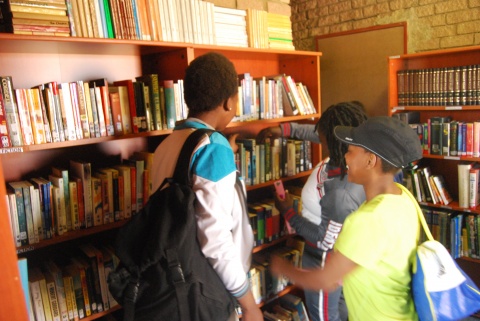
On Saturday, 25 August, Ikamva Youth’s Ebony Park Branch opened it’s own library. It was opened after a ceremony introducing the Ikamvanites to the library and its rules. After watching entertaining videos on the wonder of books, learners made their own bookmarks in anticipation of reading the library’s books. After the ceremony, excited Ikamvanites were allowed to go to the library. For the first time books were taken out of the newly established library. Hopefully this will expose them to the joys of books, establishing a culture of reading at the Ebony Park Branch.

(Ikamvanites deciding which books to take out from the library)
Just over a year ago, Ikamva volunteer Nthabiseng Mokoena realised that the Ikamvanites lacked access to books. After consulting with other volunteers at the Branch, as well as Ikamva employees, she decided to start a library. With a generous donation of book shelves from Robert Barkahuizen, the process of the forming the library began. Nthabiseng, and fellow volunteer Samuel Suttner, collected books from various sources, including family, friends, and fellow Wits’ students. There were considerable donations from Pat Tucker and from the Matla Runners, and assistance from Prof. Bhekizizwe Peterson and the Wits Volunteer Programme.
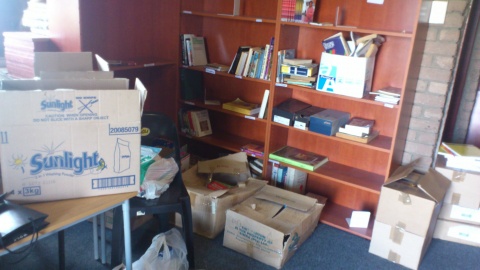
(The library, still a work in progress)
Once the books were collected, the arduous task of setting up a cataloguing system for the library began. With the help of a former librarian, Lucille Katz, and Lucy Verbeek, this was done over many months. They set out the library, categorising and cataloguing the many books
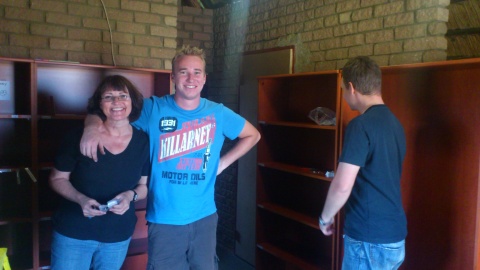
(Lucy Verbeek (left) and her son helping out with the library.)
There was no funding for the library; all the resources for it were donated by people who believed in the importance of having a library for the Ikamvanites. The views of those who assisted with the establishment of the library were expressed by the novelist Zadie Smith: “A lot of people don’t have books on their shelves. The library was the place I went to find out what there was to know. It was absolutely essential.”
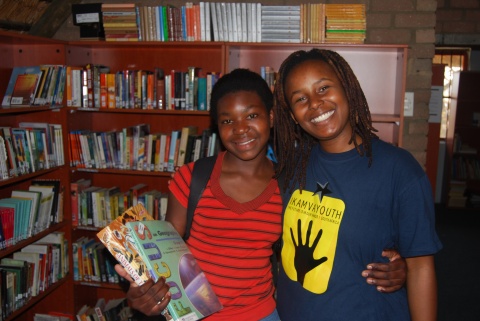
(An Ikamvanite takes out books, with volunteer Nthabiseng Mokoena – right).
We would like to thank the following people for their assistance:
Andrew Barrett; Hlengiwe Radebe; Judy Engela; Karuna Singh; Gill Laburn and the Matla Runners; Lucille Katz; Lucy Verbeek; Nyasha Mutasa; Pat Tucker; Patrick Zimba; Prof. Bhekizizwe Peterson; Robert Barkahuizen; Seth Musker; Stephanie Simpson; Talent Mzili; Thapelo Mokoena; Tiffany Ebrahim; Wits Volunteer Programme, Wits University; Wits Bachelor of Accounting Science, Fourth Year Class of 2012.
Written by Nthabiseng Mokoena and Samuel Suttner

(Listen to the actual debate at http://www.bbc.co.uk/radio/player/p00x8h4d)
Ikamvanites in Gauteng were invited to take part in the BBC Africa Debate at the University of the Witwatersrand on the 31st of August. The question posed was: South Africa at 18- Does black and white still matter in the rainbow nation? (Unfortunately, due to the nature of the topic and the manner in which BBC radio created the racial references, this article will also be using such terms.)
The debate was hosted by BBC radio presenters, Audrey Brown and Karen Allen, and a panel of speakers selected by BBC in an attempt to represent the “Born Free Generation” as people born on or post 1994. The panel was a strategized mix of Black and White persons from St Benedict’s Private School, Pretoria Boy’s High and Wits Students in an attempt to represent “all” youth. The audience consisted of political party representatives, organisations like Ikamva Youth and academics.
The panellists were divided both racially and with their opinions. However, their opinions were not divided according to race as predicted. Throughout the debate, depending on one’s personal background, circles of influence, experiences and current state of affairs, people felt and saw things differently.
Some youth stated that race does still matter and is still used as a form of identifying and relating to people – finding a commonness (based on cultural, linguistic and socio-economic) amongst a diversified crowd and finding it easier to socialise better with people who have the same social backgrounds. Is this based on the fear of rejection and the need for belonging that most humans feel? On the other hand, as highlighted by the presenters, race is possibly merely used as a code to cover up other issues, such as how race is experienced on a social level. It was great to see that after the debate, the IkamvaYouth learners, also Born Free, interacted with people outside of their normal circle – spreading their horizons.
Some of the issues raised involved nationalisation,education and poverty. A poll was raised and showed that the majority of the attendees were against nationalisation. In terms of the economy, some ‘Born Free’ learners argued that the need is for South Africa to focus on the mines and entrepreneurs to grow the national economy in order to develop society. The issue of shared wealth was then raised and with this race dimensions came up again. A majority of the audience share the view that the majority of poor people are black because the majority of South Africans are black and it is an underdeveloped country – hence the poverty. However, many still see it as: Black people are poor because they are black and financial status is a racial issue construed by the past racial injustices.
Most issues that were given attention were national issues. Policies of Apartheid reformation such as Affirmative Action, BEE and the Constitution were brought up and their role in healing the racial divide were questioned. Unemployment and access to equal opportunities is an evident issue that maintains the gap between the rich and poor. With statistics showing that South Africa has overtaken Brazil GINI ratio – wealthiest. White per capita is 8 times more than black per capita.
This shows that real issues facing South Africans are issues of inequality based on many issues with race only being a structural component created by history and inherently inherited.It was largely seen that differences in race still matters only because South Africans make it matter. All the views of participants were forcibly related to racialism and were rarely from a personal experience of injustice. It seems that society continues to insist on segregation economically, linguistically, geographically and ethnically. One of the audience members noted that: ‘the rainbow colours never mix’, maybe it is inherently human nature to distinguish through separation rather than taking advantage of differences to enhance the whole. There is a shared fear of being different because South Africans were once forced to be different based on race only. The question posed was: when will South Africans stop being forced as well as force ourselves to view one another as Black and White?
IkamvaYouth is at the core at tackling these issues and is a community that is aware, wants to be heard and has the power to make a greater change – The views many Ikamvanites have are from a personal and sincere point of view. These views matter and make issues and discussions more linked to the humaneness of the issues people face on their daily lives.

Ikamvanites, Speak Out! Only you can represent your views with the intensity that they should be viewed. If you feel strong about something – Shout!
Thank you IkamvaYouth for showing us that our voice matters!
Written by Kihisha Suleman (Volunteer in charge of Career Guidance at Ebony Park)
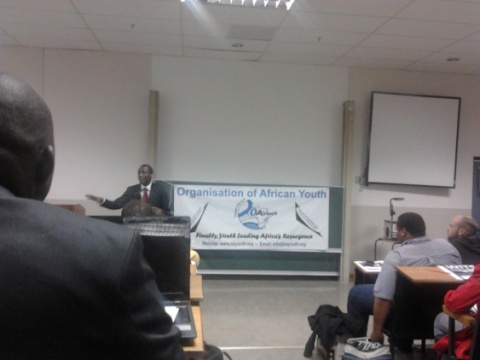
The event, which took place on the 18th of August, was an attempt at creating a platform for the youth as individuals, and representing organisations, to discuss issues and challenges facing South Africa, and contribute in generating solutions. The event was hosted by the Organisation of African Youth, in partnership with the Wits Disability Unit and The Consulting Academy.
The Symposium, the first of many that shall foster platform for the youth to begin setting the agenda and enabling environment to discuss issues affecting the country as a whole, and not remain pedestrian by-standers in issues of national interest. According to the official guest speaker, Patson Malisa,”We (the youth) are the most important component towards the change and revival of the African Continent,”.
As the crowd discussions commenced, the audience still referred to “they” and “I” rather than forming a collective group of responsible youth. Patson highlighted the importance of values such as selflessness and the power of united voice as the youth.

A freelance journalist for Mail & Guardian attended the event and was in search for answers. I took a leap to market IkamvaYouth and told him the importance of the event, and that IkamvaYouth as an organisation consisted of youths that are motivated to resolve issues surrounding the education crisis in South Africa. I informed that the IkamvaYouth model has seen a by-the-youth, for-the-youth revolution in education for all beneficiaries and volunteers.
Representatives of other organisations such as Africa Tycoon and Pretoria Boy’s High provided their perspectives. The lack of leadership was addressed and seen as due to a lack of responsibility and the issues of leaders of the majority being chosen by the minority.
The second issue raised for discussion looked into the gap between the rich and poor. I personally gave insight, stating that the problem lies with a misconception of the meaning of wealth as “What others have that I do not have”. I then provided an alternative school of thought based on the concept of individuals needing to define their own meaning of wealth to attain their personal success. Similarly, one academia stated that the term ‘rich’ must be measured in terms of productivity as that is a true reflection of the attained resources.

The Symposium was a great attempt to a solution driven platform by the youth. While there remains a long way to go in achieving a holistic dimension to contributing to making our country and Africa a better place for everyone, the small efforts of helping one learner at a time as we do at IkamvaYouth is a great step that must never be despised. As the youth, we have what it takes to address all the ills affecting our communities, if only we can be a united front to this end!!
-Kihisha Suleman-
It is important to explore different cultures with others and there are so many ways to do so.
On Tuesday the 14th of August, the Ebony Park homework session was a hub of activity as the volunteer Pakistani interns decided to celebrate Pakistani Independence Day with the learners. After the homework session, Akbar Raza, along with Rafay and Abdul Samad Zia, taught the learners the Pakistani National Anthem ‘Dil Dil Pakistani!!’. The learners and Interns had a real great time. The video of this exciting moment can be viewed
here.
Believe it or not, our young Ikamvanites are on the road to learning “Urdu” the official Pakistani language.
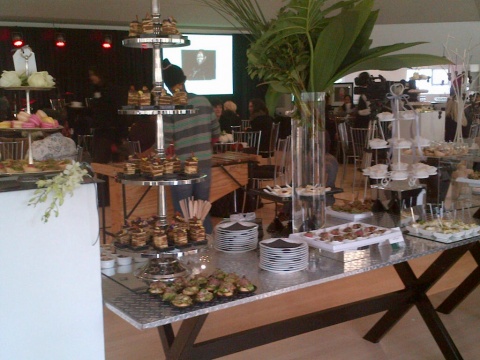
Zamo Shongwe, the IkamvaYouth National Coordinator has been featured in a Mail and Guardian Book called, ” The Mail and Guardian Book of South African Women.” Tuesday 7th of August was a very memorable day for IkamvaYouth as the nation celebrated and acknowledged Zamo and other women who have dedicated their lives to making South Africa a better nation. These women featured in the book, were noted to be women who have achieved the impossible, frequently with few or no resources.
The 2012 edition of the book was launched at Middleton Hotel in Sandton and was filled with laughter, fun, art , entertainment and a call for women to do more in our communities. The book which started seven years ago is a celebration of our country’s women and is supported by Nedbank.

You can check out the book by clicking here and Zamo’s profile can be found by clicking here.
We are all so proud of you Zamo!
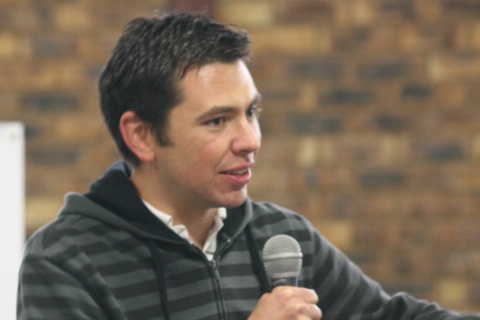

The last day of winter school for the Ebony and Ivory Park branches was filled with mixed emotions. We were sad about the end of winter school, uplifted by the amazing contributions at the talent show, and overwhelmed by a rather daunting part of the programme: “Andrew’s Farewell”. Andrew has been a key ikamvanite since 2009 and his contribution has been so significant that it’s really rather impossible to say goodbye. We have this saying “once an ikamvanite, always an ikamvanite”, and so, rather than bidding Andrew farewell, we spent some time thanking and celebrating him.
Andrew and I first met in 2008, when he became interested in our Operation Fikelela curriculum and its potential use for Siyakhula. He was interested in the IY model, decided to pilot it, and then founded IkamvaYouth Gauteng in 2009. His selfless commitment to realising his vision for the Ebony Park community has been relentless; he has been at every single Saturday tutoring session for three and a half years, and has built not only two branches in Gauteng, but played a key role on natcom, informing who we are and how we do things, and enabling us to become an organisation with a national footprint.
Together with the many learners, tutors and supporters whose efforts he’s inspired and coordinated along the way, Andrew has made an incredible impact. In 2011, the Ebony Park branch achieved a 94% pass rate and 100% post school placement, with 45% at universities, and last year they reached a 100% pass rate and 83% access to tertiary.
Not only has Andrew’s work fundamentally changed the lives of the people he’s worked with, but he has established something that will keep on changing many lives. The individuals who were learners during Andrews time will become the tutors who will support more learners to reach similar heights.
But this work is not easy, and it’s this, even more than the outcomes that I want to thank Andrew for. Andrew has essentially been volunteering for IkamvaYouth all of this time. He has a full-time job running his own NGO, and has sacrificed massive amounts to create this beautiful home for all of us. And he even managed to study and win awards in addition to his two full time jobs! He has sweated the small stuff: filling out attendance, capturing data, making sandwiches and dealing with the un-fun aspects of this work. And he’s also been a visionary leader who’s inspired hundreds of people to change the world.
So I’m not going to say farewell. I know that our organisations will continue to collaborate and that ultimately we are still working together towards the same goal:
The fact that 2 million of the 2.8 million South Africans Not in Education, Employment or Training (NEETS) haven’t passed matric tells us something about how to fix this problem. What IkamvaYouth and Siyakhula are working towards is ensuring that young South Africans don’t become NEETS but rather IETS. (“Iets” means “something” in Afrikaans.)
So what IkamvaYouth and SEF and everyone in that room on the last day of winter school, led by Andrew, is doing, is ensuring that ikamvanites become iets; become something. Ikamvanites become something so great that very soon they can in turn help other learners to become something. And what ikamvanites are going to become and are becoming already, are the leaders of the country. Because the generations before us do not know how to fix this problem. The education crisis is so huge and so massive that they are scared by it. But we do know how to fix it. And instead of wringing our hands and talking about how we need to work together to fix things, we’re getting on with it.
That’s what Andrews been doing for the last 4 years, and, through SEF, is going to continue doing for the next many years, and so this isn’t a goodbye but a huge thank you. For your leadership, your volunteerism, your inspiration, your selflessness, for challenging us, for pushing us, and for sharing all you know with this amazing team of people who will continue with the amazing work you started.











 Lloyd Lungu
Lloyd Lungu